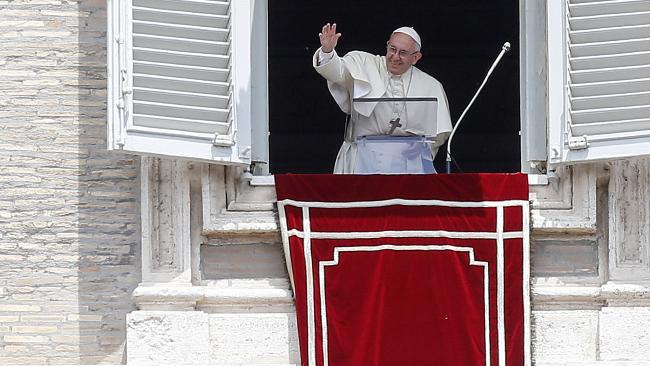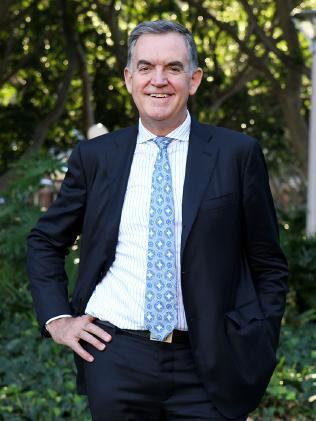|
George Pell, Danny Casey and the Vatican’s books
By Leo Shanahan
When business managers complain about having to reform “ancient” institutions, not many are speaking literally. But as chief adviser to Cardinal George Pell — the Vatican’s top financial official — for the past 2½ years, Danny Casey has faced challenges more than 2000 years in the making. Casey, who leads the project management office in the Secretariat for the Economy, says Cardinal Pell’s decisions have to be based on business rather than religious grounds. “One of the lines is that we need to be businesslike, recognising that we aren’t a business … that’s really the theme of what we have been asked to do at the Vatican,” Casey tells The Deal on a recent visit home. “We’re not a business, we’re sovereign and quite different. But that’s no excuse for not being businesslike, that’s no excuse for not having benchmarks, for being sloppy, for having lazy assets on the balance sheet that could be put to greater work.” Pell’s time in Rome has been dominated by the royal commission into child sex abuse and his decision to give evidence via video link rather than return to Australia. But despite his image as the archetypal conservative, within Vatican ranks Pell is considered a radical in his efforts to overhaul the church’s finances. Pell was put into the job by Pope Francis in February 2014 and with the aid of Casey has overseen a transformation of Vatican finances. Casey finishes up in September and will return to Australia; Pell’s tenure was extended for two years after he tendered his resignation in June as per protocol, having turned 75. Casey worked at Lend Lease, Ernst & Young and Middletons (now K & L Gates) before his appointment in 2003 as business manager at the Sydney Archdiocese — the first layman to hold the post. He and Pell had worked closely together and when Pell got the Vatican job he determined to take Casey’s expertise with him. “He [Pell] said, ‘If I had a priest here with the exact same CV I’d take the priest, but I don’t have a priest with that level of experience’.” Casey says one of the biggest challenges in Rome was a culture that did not question the actions of authorities, which had led to antiquated and inefficient business practice. “Questioning superiors is not really the culture. But where we come from it certainly is and we welcome it … In a successful change process there needs to be very, very clear communication … For example, we didn’t have a standard charter of accounts with key definitions.” Other discoveries were more significant and revealed billions of euros in assets that had been previously off the books. “There was so much off the books,” Casey says. “It doesn’t mean there was skulduggery or financial malpractice, but in the absence of having some transparency of financial investments off the books how do you know? The total amount off the books, when you take into account the entities, was about €2 billion ($3bn).” Several transactions were worrying enough to alert law enforcement and regulatory authorities. “There have been a number of suspicious transactions that have been reported to the relevant authorities and are still being investigated,” says Casey. “I am well aware of my obligations to report matters that might be considered suspicious. There is a very tough internal framework to deal with and I’m happy with that. The [Italian] financial investigation agency has back-to-back agreements with other agencies around the world and they are particularly concerned with money-laundering. “I think the Vatican maintains its commitment [started by Benedict] to international standards. Cardinal Pell maintains that our benchmarks are at least as good as the very best.” Scrutiny of investments has been a key task for Casey. This includes increasing ethical investing, an area in which the Vatican’s finances have been surprisingly lacking. “Ethical investing is one area I’m working on in particular. There’s a lot of good work been done by a lot of organisations in this space and we need to be engaged in that. Slavery-proofing the supply line, for example — forced slavery is a massive issue. The starting point would be to set a framework. It would be incredible if we are investing in activities that are hostile to what we’re about.” Pell sustained severe criticism in Australia for not testifying in person at the royal commission. Casey says the cardinal was willing to travel but doctors advised against it. “He is still not allowed to do a long-haul flight. I was one of several people encouraging him to have regular health checks. He was very reluctant not to travel, he was prepared to set aside the advice of doctors.” He says Pell was very eager to meet the victims of sexual abuse in the church. “He has felt deeply for victims and the cause for many, many years. And history shows the minute he got the capacity to do it, he did. He has always been on the side of victims. If that was going to help people, he was willing to compromise issues and health advice to do so. “(It was a) challenging week for a whole lot of different people, and the cardinal would say the highlight for him was to meet, and the opportunity to engage with, those survivors who have suffered so much.” Pell’s presence as a reformer and non-Italian (and not even a European) has led some to characterise his relationship with the Vatican “old guard” as combative, with speculation that many at the Vatican were keen to take advantage of the pressure on Pell caused by the royal commission Casey talks down any major rift: “A change agent and an outsider can always be characterised as upsetting the old order. Overwhelmingly the majority of people inside those walls know this is the right thing to do. “[There was] some talk of ‘clash of cultures’ or ‘competing visions’ or ‘Italians v the others’. Most of the staff who work in the secretariat are Italian and that’s insulting to them, because they are also strongly and deeply committed to doing this. “He’s clearly there to do what the Pope wants. He’s someone doing the job he’s been asked to do, who does listen to people, and once he decides what he is going to do he does it.”
|
.
Any original material on these pages is copyright © BishopAccountability.org 2004. Reproduce freely with attribution.

